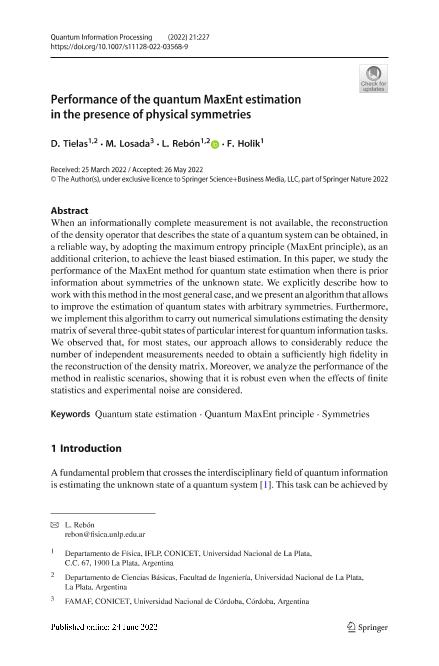Mostrar el registro sencillo del ítem
dc.contributor.author
Tielas, Diego Alejandro

dc.contributor.author
Losada, Marcelo Adrián

dc.contributor.author
Rebón, Lorena

dc.contributor.author
Holik, Federico Hernán

dc.date.available
2023-07-24T17:54:49Z
dc.date.issued
2022-06-24
dc.identifier.citation
Tielas, Diego Alejandro; Losada, Marcelo Adrián; Rebón, Lorena; Holik, Federico Hernán; Performance of the quantum MaxEnt estimation in the presence of physical symmetries; Springer; Quantum Information Processing; 21; 6; 24-6-2022; 1-20
dc.identifier.issn
1570-0755
dc.identifier.uri
http://hdl.handle.net/11336/205098
dc.description.abstract
When an informationally complete measurement is not available, the reconstruction of the density operator that describes the state of a quantum system can be obtained, in a reliable way, by adopting the maximum entropy principle (MaxEnt principle), as an additional criterion, to achieve the least biased estimation. In this paper, we study the performance of the MaxEnt method for quantum state estimation when there is prior information about symmetries of the unknown state. We explicitly describe how to work with this method in the most general case, and we present an algorithm that allows to improve the estimation of quantum states with arbitrary symmetries. Furthermore, we implement this algorithm to carry out numerical simulations estimating the density matrix of several three-qubit states of particular interest for quantum information tasks. We observed that, for most states, our approach allows to considerably reduce the number of independent measurements needed to obtain a sufficiently high fidelity in the reconstruction of the density matrix. Moreover, we analyze the performance of the method in realistic scenarios, showing that it is robust even when the effects of finite statistics and experimental noise are considered.
dc.format
application/pdf
dc.language.iso
eng
dc.publisher
Springer

dc.rights
info:eu-repo/semantics/openAccess
dc.rights.uri
https://creativecommons.org/licenses/by-nc-sa/2.5/ar/
dc.subject
QUANTUM MAXENT PRINCIPLE
dc.subject
QUANTUM STATE ESTIMATION
dc.subject
SYMMETRIES
dc.subject.classification
Física Atómica, Molecular y Química

dc.subject.classification
Ciencias Físicas

dc.subject.classification
CIENCIAS NATURALES Y EXACTAS

dc.title
Performance of the quantum MaxEnt estimation in the presence of physical symmetries
dc.type
info:eu-repo/semantics/article
dc.type
info:ar-repo/semantics/artículo
dc.type
info:eu-repo/semantics/publishedVersion
dc.date.updated
2023-07-07T17:51:52Z
dc.journal.volume
21
dc.journal.number
6
dc.journal.pagination
1-20
dc.journal.pais
Alemania

dc.journal.ciudad
Berlin
dc.description.fil
Fil: Tielas, Diego Alejandro. Consejo Nacional de Investigaciones Científicas y Técnicas. Centro Científico Tecnológico Conicet - La Plata. Instituto de Física La Plata. Universidad Nacional de La Plata. Facultad de Ciencias Exactas. Instituto de Física La Plata; Argentina
dc.description.fil
Fil: Losada, Marcelo Adrián. Universidad Nacional de Córdoba. Facultad de Matemática, Astronomía y Física; Argentina. Consejo Nacional de Investigaciones Científicas y Técnicas; Argentina
dc.description.fil
Fil: Rebón, Lorena. Consejo Nacional de Investigaciones Científicas y Técnicas. Centro Científico Tecnológico Conicet - La Plata. Instituto de Física La Plata. Universidad Nacional de La Plata. Facultad de Ciencias Exactas. Instituto de Física La Plata; Argentina
dc.description.fil
Fil: Holik, Federico Hernán. Consejo Nacional de Investigaciones Científicas y Técnicas. Centro Científico Tecnológico Conicet - La Plata. Instituto de Física La Plata. Universidad Nacional de La Plata. Facultad de Ciencias Exactas. Instituto de Física La Plata; Argentina
dc.journal.title
Quantum Information Processing

dc.relation.alternativeid
info:eu-repo/semantics/altIdentifier/url/https://link.springer.com/article/10.1007/s11128-022-03568-9
dc.relation.alternativeid
info:eu-repo/semantics/altIdentifier/doi/https://doi.org/10.1007/s11128-022-03568-9
Archivos asociados
